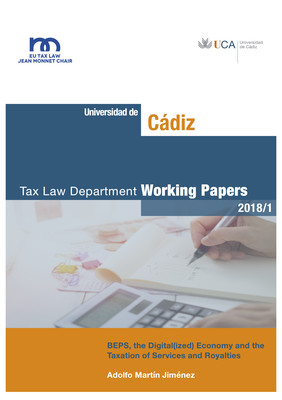Tax Working Paper 2018/1: BEPS, the Digital(ized) Economy and the Taxation of Services and Royalties 20 junio 2018
BEPS, the Digital(ized) Economy and the Taxation of Services and Royalties
by Adolfo Martín Jiménez
Arguably, taxation of the digital (or digitalized) economy is one of the trendiest topics in recent years and much attention will be devoted to it until 2020, when the OECD is to release its final report on the topic, and beyond. In this debate, it is common to stress that the (old) international tax system needs to adapt to the evolution of technology and business models, and new solutions are necessary to update tax treaties designed for a physical – and not digitalized – economy. That proposition has the curious feature of turning into old what is (almost) brand new (the G20/OECD Base Erosion and Profit Shifting (BEPS) outputs of 2015) and rejects (probably too quickly) standards that are old, but could also serve to deal with ‘new situations’. Therefore, the point of departure of this article is that before throwing away what has been consolidated over many years of evolution, one must be sure that something new is indeed needed and would be better than the old tools, even if the old tools may need to evolve rather than being changed in a, more or less, radical form. In other words, the new solutions for the digital economy are necessary only if the traditional toolkit (i.e. the OECD Model Convention (the OECD Model)) and the more recently crafted BEPS principles – which have not yet been fully developed, exploited or tested – are insufficient or flawed, or if there are no other solutions in the international tax arena that could be better than the new proposals.
In line with this initial idea, this article begins in section 2. by pointing out some of the virtues (design of negative and positive source rules), biases (too much attribution of income to certain features of a multinational enterprise (MNE) group, namely risk control and certain intangibles and intangible-related functions) of the BEPS project outputs, and where the OECD/G20 BEPS project has been insufficient to end (potential) BEPS strategies (the taxation of services and royalties). This initial reflection provides a context to speculate in section 3. on whether the most popular initiatives proposed in the OECD discussions on the digital economy (the significant economic digital presence permanent establishment (PE), withholding taxes on goods and services provided online or variations thereon, such as equalization taxes) are fit for purpose, and to conclude that these ‘solutions’ may present a number of problems, including the abandonment of the already agreed BEPS principles and their limited impact without effectively tackling the most pressing issues left open by BEPS. It is suggested that a more natural and effective solution would be to attempt to develop already agreed principles, and further advance in the enhancement and implementation of the concepts agreed, or even to consider the effectiveness of other more traditional tools (withholding taxes on services and royalties).
As a complement or an alternative, section 4. refers to what the UN is doing in connection with the taxation of royalties and services, and ponders whether it would be better to adopt this standard rather than the new solutions devised for the digital economy. In turn, Section 5. focuses on the recently released (and, in the author’s opinion) flawed proposals by the EU.
Finally, section 6. concludes that the debate on the taxation of the digital economy (a mixture of economics and legal reasoning together with policy and politics) reveals the frailty of the international tax system, as well as creates the risks of further fragmentation. The more evolutionary approach of the current international tax principles, as agreed in the BEPS project and how they are evolving in the UN context, may be a better solution for the taxation of not only the digitalized economy, but also MNEs or enterprises in general, in order to advance in aligning taxation with economic activity and to preserve the coherence of the international tax system and, eventually, make it more robust.


